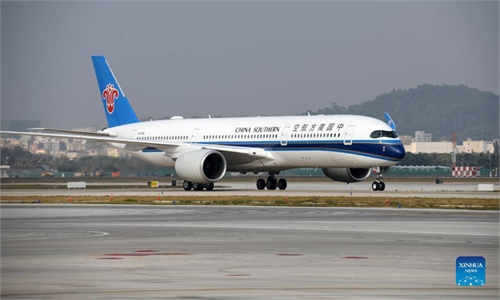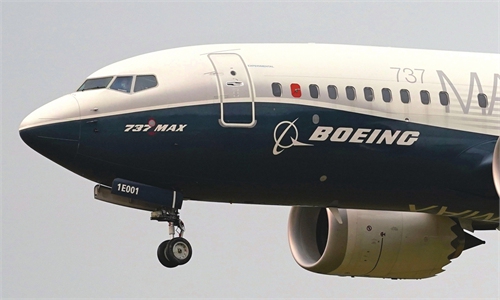
Illustration: Chen Xia/Global Times
US aircraft manufacturer Boeing is offering 737 MAX jets once destined for Chinese customers to Air India. The planemaker may resell up to 50 of the 140-some already-built planes it's "not allowed to deliver" amid US-China trade tensions, Bloomberg reported on Tuesday.In the narrative of some US media outlets, the US planemaker has long been depicted as a victim of the soured trade relationship between the US and China. While the frustration Boeing experienced in the Chinese market in recent years is the result of multiple complex reasons, it is undisputed that the US company's current predicament should never be blamed on China.
When three major Chinese airlines in July announced a $37 billion deal to buy a total of 292 planes from Airbus, Bloomberg said it was a sign sent by China, and it "hurts Boeing terribly."
Boeing is disappointed, complaining that "geopolitical differences" between the US and China were bruising its business prospects, the report said. If anything, the sour sentiment in US public opinion toward the normal and mutual beneficial deal reflects how far the US has gone in its blame game against China.
We need to remind the US that the escalating China-US trade tensions were entirely and unilaterally caused by the US. The Trump administration brazenly launched a trade war against China, and the Biden administration has been using the Trump tariffs as a bargaining chip to suppress China.
Although China has repeatedly shown goodwill and sincerity to ease economic and trade tensions, the US insists on going further and further down the wrong path. If Boeing is disappointed, it can only complain about the US government and nothing else.
More importantly, compared with Airbus, Boeing's frustrating performance in the Chinese market is not mainly due to China-US geopolitical differences, but economic factors such as product performance, safety and cost-effectiveness, especially amid the earlier grounding of Boeing 737 MAX planes due to safety concerns.
In addition to safety concerns, disruptions to the US domestic supply chain have also affected Boeing's ability to deliver, with reports saying it had to temporarily suspend 737 production in May.
Judging from the global market, since 2019, Airbus has been ahead of Boeing in terms of competing for passenger aircraft orders and market share. If the US doesn't look at Boeing's frustration objectively from a market and economic perspective, it will be hard to reverse Boeing's competitive disadvantages against Airbus, whether in the Chinese market or across the world.
Boeing is an epitome of US companies that have experienced a backlash due to the politicization of economic and trade issues by the US. The American manufacturing industry, in the end, is inseparable from the Chinese market, and Boeing is a good example. Washington should realize that political manipulation cannot win over the laws of the market after all.
China is the world's second-largest and fastest-growing civil aerospace and aviation services market. According to Oliver Wyman's MRO Market Economic Assessment, China is expected to become the largest air travel market in the world by 2030. Commercial opportunities in China's civil aviation services market offer great significance to Boeing, if it wants to boost its growth.
If the US government continues to let some US politicians' manipulation intensify a decoupling from China, Boeing, as well as US manufacturing, will face long-term pain. According to an earlier assessment by the American Chamber of Commerce, if the US engages in a comprehensive "decoupling" from China and completely cuts off sales to China in the field of civil aviation, this would cause US output losses ranging from $38 billion to $51 billion and cause the US civil aviation manufacturing industry to shed 167,000 to 225,000 jobs.
Boeing's predicament reflects common problems battering the American manufacturing sector. As the US is suffering from a severe manufacturing hollowing-out, successive US presidents have sought to revitalize the country's manufacturing industry, including the current attempt to transfer production back to the US.
Although one of the main goals of Trump's trade war with China was to bring manufacturing back to the US, it didn't change the trend of the decline that continued year by year. As of 2019, the proportion of manufacturing in US GDP had fallen to less than 11 percent.
Boeing is part of a long US manufacturing industry chain, which is of great significance to the US manufacturing industry. Aviation analysts said that Boeing-made planes are the largest single US manufactured export product. If Washington wants to revitalize US manufacturing, it must first help Boeing out of its current predicament.
The author is a reporter with the Global Times. bizopinion@globaltimes.com.cn


